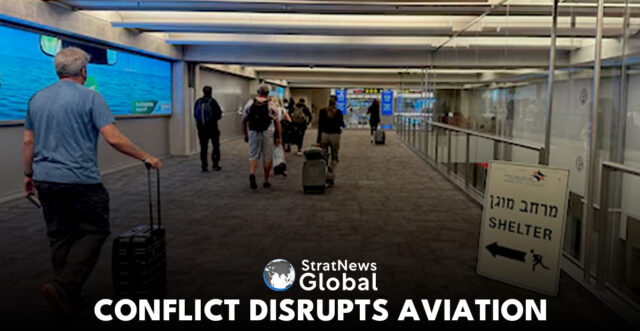Airlines swiftly cleared the skies over Israel, Iran, Iraq, and Jordan on Friday following Israeli strikes on targets in Iran, according to Flightradar24 data, as carriers rushed to reroute or cancel flights to protect passengers and crew.
Proliferating conflict zones around the world are becoming an increasing burden on airline operations and profitability, and more of a safety concern.
Six commercial aircraft have been shot down unintentionally and three nearly missed since 2001, according to aviation risk consultancy Osprey Flight Solutions.
Israel Targets Iran’s Nuke Sites
Israel on Friday said it targeted Iran’s nuclear facilities, ballistic missile factories and military commanders at the start of what it warned would be a prolonged operation to prevent Tehran from building an atomic weapon.
Tel Aviv’s Ben Gurion Airport was closed until further notice, and Israel’s air defence units stood at high alert for possible retaliatory strikes from Iran.
Israeli flag carrier El Al Airlines said it had suspended flights to and from Israel.
Iranian airspace has been closed until further notice, according to state media and notices to pilots.
As reports of strikes on Iran emerged, a number of commercial flights by airlines including Dubai’s Emirates, Lufthansa and Air India were flying over Iran.
Air India, which overflies Iran for its Europe and North American flights, said several flights were being diverted or returned to their origin, including ones from New York, Vancouver, Chicago and London.
Emirates and Lufthansa did not immediately respond to requests for comment.
Iraq Closes Airspace
Iraq, early on Friday, closed its airspace and suspended all traffic at its airports, Iraqi state media reported.
Eastern Iraq near the border with Iran contains one of the world’s busiest air corridors, with dozens of flights crossing between Europe and the Gulf, many on routes from Asia to Europe, at any one moment.
Flights steadily diverted over Central Asia or Saudi Arabia, flight tracking data showed.
Jordan, which sits between Israel and Iraq, closed its airspace several hours after the Israeli campaign began.
“The situation is still emerging – operators should use a high degree of caution in the region at this time,” according to Safe Airspace, a website run by OPSGROUP, a membership-based organisation that shares flight risk information.
Several flights due to land in Dubai were diverted early on Friday. An Emirates flight from Manchester to Dubai was diverted to Istanbul, and a flydubai flight from Belgrade was diverted to Yerevan, Armenia.
Budget carrier flydubai said it had suspended flights to Amman, Beirut, Damascus, Iran and Israel and a number of other flights had been cancelled, rerouted or returned to their departure airports.
Qatar Airways cancelled its two scheduled flights to Damascus on Friday, Flightradar24 data shows.
Middle East Conflicts Disrupt Aviation
The Israeli-Palestinian conflict in the Middle East since October 2023 has led to commercial aviation sharing the skies with short-notice barrages of drones and missiles across major flight paths – some of which were reportedly close enough to be seen by pilots and passengers.
Airspace in the Middle East last year was crossed daily by 1,400 flights to and from Europe, Eurocontrol data show.
Last year, planes were shot down by weaponry in Kazakhstan and in Sudan. These incidents followed the high-profile downing of Malaysia Airlines flight MH17 over eastern Ukraine in 2014 and of Ukraine International Airlines flight PS752 en route from Tehran in 2020.
(With inputs from Reuters)





